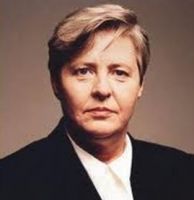Johanna Dohnal
Feministic Politican
Johanna Dohnal, maiden name Johanna Dietz, was a forrunner for feministic politics and first minister for women`s affairs in Austria. Her politics were always orientated to the standard of living concerning all women.
Johanna has grown up in her childhood and youth with her grandmother as an illegitimate child in very restricted poor circumstances. Though she learned very well in school but she had no chance to get a higher education. However she managed the training for an office administrator. At the age of 18 she married Franz Dohnal, a trained smith and tramway employee. At the age of 22 she was already mother of two children but had to do again outwork or homework.
These years were the beginning of her commitment in the Socialist Party of Austria where she could look after the offered possibilities of further education and realize own ideas with reference to politicizeing women´s labour. She was given the first politic mandates as District Representative in 1969, 1973 -1979 as Council Woman in the municipitality and a seat in the cantonal parliament. Moreover she was involved in the center of the Socialist Party.
An outstanding project was the opening of the first Viennese women`s refuge 1978. 1979 she was appointed State Secretary for general women`s affairs. Now she got the chance to do not only her politics for women but also to translate them by teamwork together with other women into action. Thanks Johanna Dohnal, politics for women became governmental politics. She achieved this by her activities as State Secretary, then 1991 as the first Austrian minister at women`s affairs.
Already before there had emerged considerable steps forward in women`s politics influenced by Johanna Dohnal. For example the abolition of the penalty for abortion- connected with an allowing the termination of a pregnancy within the first three months; the establishment of equal rights of women and men by law in the framework of reforming family rights; the new laying down of legal personal effects of marriage; legal claims for advance maintenace towards the fund to compensate family difficulties; a new regulation of the rights for legitimate children and the legal right of inheritance for a spouse.
In 1979 a law laying down the equally treatment of women and men in regard of fixing remunerations was issued. Moreover there were established handycraft lessons in elementary schools for girls and boys. In 1979 the first women`s commitee took place in Vienna; then followed the installation of a women`s service institution in the Federal Chancellery and the establishment of a national fund for the assistance of children in the Third World.
Since 1983 mothers can pass on their nationality to their children; In 1989 the inevitable care of an official guardian for illegitimate children was abolished.
On the other hand the punishment for matrimony rape took place and mesures to protect wives against marital violence. Sexual harassment on workingplaces was forbidden by law. Since 1990 both partners of a married couple could maintain their previous names by a change of the relevant law.
1995 Johanna Dohnal retired from politics, nevertheless she commited herself furthermore in the political areas she had influenced by her cooperation with universities, NGO´s, women`s organisations and labour unions as well as in the Web. In 2008 she published a book based on her guest lectures at the Innsbruck University titled "Innersightings of Austrian Women`s Politics".
Johanna Dohnal`s dreams of hope were described by herself as following: "The vision of feminism is not a femal future. It is a human future without compelling performance, without alliances of men, without femininity mania".
Author: Elfriede Marek
Sources:
Johanna Dohnal in „Innensichten österreichischer Frauenpolitiken“ Innsbrucker Vorlesungen, Hsg.Erika Thurner, Alexandra Weiss, 2008/Innsbruck/Studienverlag
Johanna Dohnal: http://de.wikipedia.org/wiki/Johanna_Dohnal
Photocredits: Johanna Dohnal, author unknown.
Sources: Johanna Dohnal by Kreisky-Archiv, with kindly permission 22. O2. 2014




